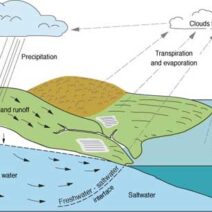As we traverse the complexities of our modern world, one pressing question looms: “What will it take for us to genuinely comprehend the implications of climate change?” This inquiry invites us to challenge our perceptions and confront an impending dilemma that affects each of us, regardless of our individual actions. Will we embark on a journey of proactive transformation, or will we stand by, mere spectators in a narrative that continues to unfold, often unfavorably?
Climate change, an overarching phenomenon that transcends borders, is intrinsically linked to both natural processes and anthropogenic influences. Its repercussions seem insurmountable; from erratic weather patterns to rising sea levels, every facet of life is interwoven with the earth’s climatic tapestry. This reality imposes profound effects, not only on ecosystems but also on human health, economic stability, and even social equity. Thus, recognizing that climate change is not a distant threat becomes paramount.
Consider the recent shift in global temperature trends. The past century has witnessed an increase averaging nearly 1.2 degrees Celsius. While this might seem insignificant, even slight temperature escalations can catalyze extensive repercussions. Agriculture, a cornerstone of human survival, is exceedingly sensitive to climate variations. Regions previously hailed for their agricultural bounty may find themselves in dire straits, struggling under the weight of droughts or excessive rainfall. Will the farmers of tomorrow be equipped with the tools to adapt, or will we bear the brunt of escalating food prices?
Moreover, the health ramifications of climate change cannot be overstated. As temperatures rise, so do the incidence rates of heat-related illnesses. Vulnerable populations, particularly the elderly and children, may find themselves at greater risk. Furthermore, the proliferation of vector-borne diseases—borne by organisms like mosquitoes and ticks—will likely expand, as these pests flourish in warmer climates. Are we prepared to tackle an emerging health crisis that climate change could precipitate?
In terms of economic impact, the stakes are substantial. Extreme weather events, such as hurricanes, floods, and wildfires, have already led to catastrophic infrastructure damage in various regions. The aggregate costs, both insured and uninsured, run into the hundreds of billions. As climate realities become increasingly evident, industries such as agriculture, fishing, and tourism may face immense pressures, potentially sparking a cascade of job losses and economic dislocation. What adaptive strategies exist to mitigate these financial losses?
Furthermore, the social equity implications are equally grim. Climate change acts as a magnifying glass, amplifying existing social inequalities. Marginalized communities often bear the brunt of environmental injustices, suffering disproportionately from the effects of climate-related disasters. The question then arises—how can we ensure equitable access to resources and support systems for all, particularly when those most affected often possess the least political power?
The ecosystem around us is yet another casualty of global warming. Habitats are shifting, species are migrating, and extinctions are becoming increasingly common. Coral reefs, which serve as vital components of marine biodiversity, are succumbing to bleaching events exacerbated by rising ocean temperatures. If the intricate web of life continues to unravel, how will this affect our natural world and the resources it provides? The delicate balance that sustains our planet is at risk, challenging us to consider our stewardship over this fragile environment.
The interconnected nature of climate change necessitates a global response, revealing the impotence of isolated efforts. Are we willing to invest in renewable energy and sustainable practices that could mitigate some of these effects? By transitioning to greener technologies, harnessing solar and wind energy, and encouraging sustainable agriculture, we may buffer ourselves from the worst consequences of climate change. Yet, the challenge remains—will we act swiftly enough?
Introspection is critical. Societal attitudes towards climate change have historically oscillated between dissent and indifference. Collective action begins with education and awareness. The challenge lies not just in understanding the phenomenon but also in mobilizing communities to advocate for systemic changes. It prompts another thought-provoking question: what does accountability look like in the context of climate responsibility?
At the individual level, one might ponder the impact of lifestyle choices on broader environmental issues. Small actions, such as reducing waste, conserving water, or supporting local businesses, can cumulatively result in substantial change. However, systemic issues necessitate systemic solutions. How do we ensure that individual efforts translate into collective progress? This is where policy change and community mobilization become paramount.
As we contemplate the realities of climate change, it becomes evident that its effects will inevitably touch every facet of our lives. The urgency to act grows stronger with each passing day. Whether through proactive engagement or passive observation, we will experience the consequences. The pivotal question remains: will we rise to meet this challenge, or will we allow ourselves to be swept along by forces beyond our control?
In conclusion, climate change poses a multifaceted challenge that is inescapable and complex. Through awareness and action, we can begin to alter our trajectory, fostering a more sustainable coexistence with the planet. However, the time to act is now, for the repercussions are not confined to tomorrow; they are intricately woven into our present reality.


